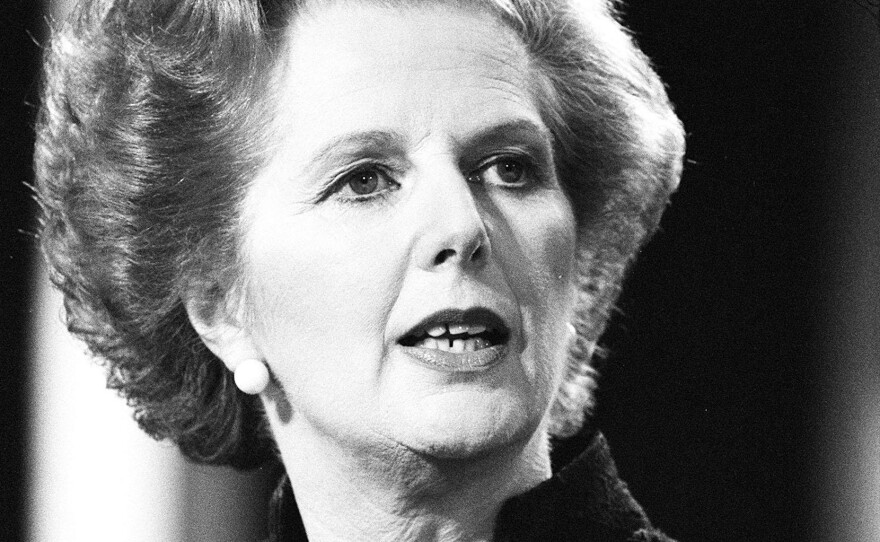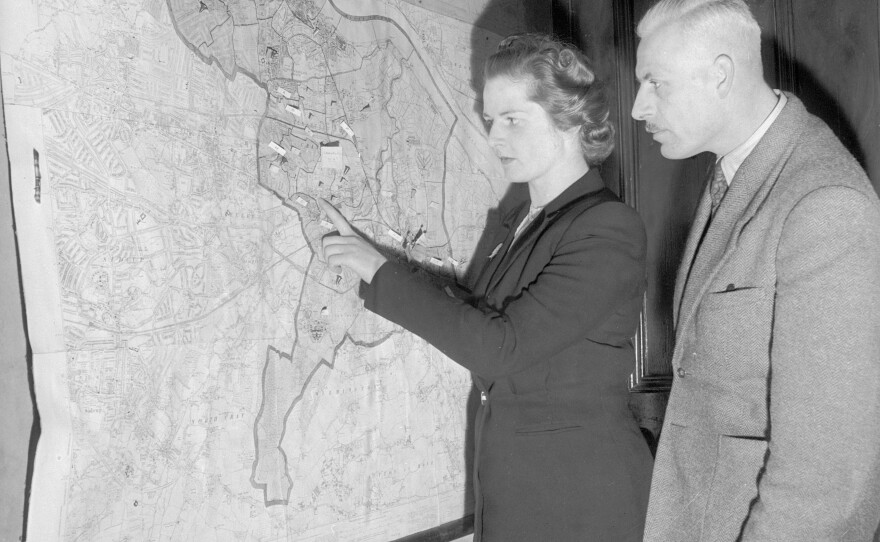
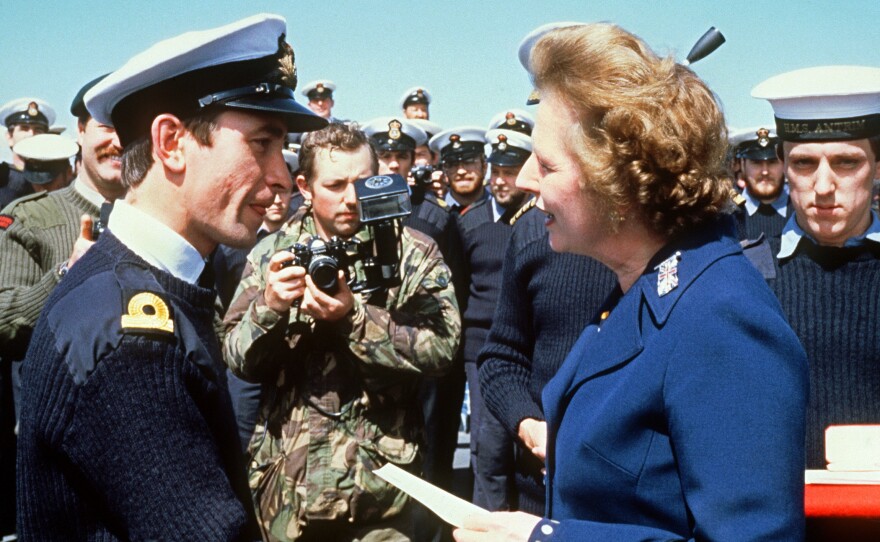
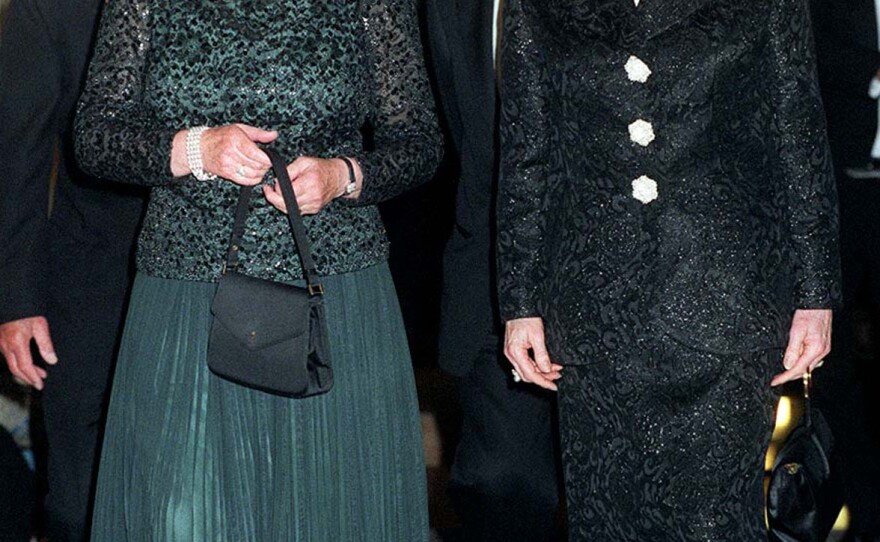
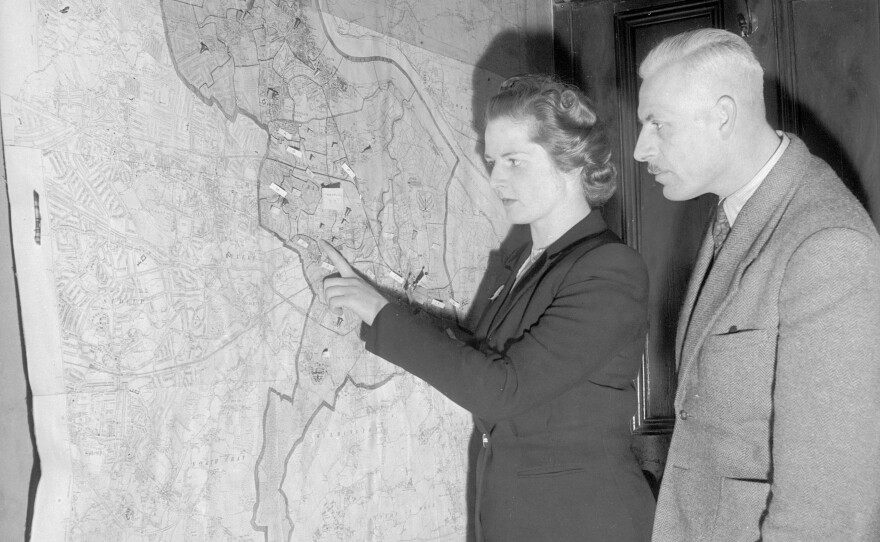
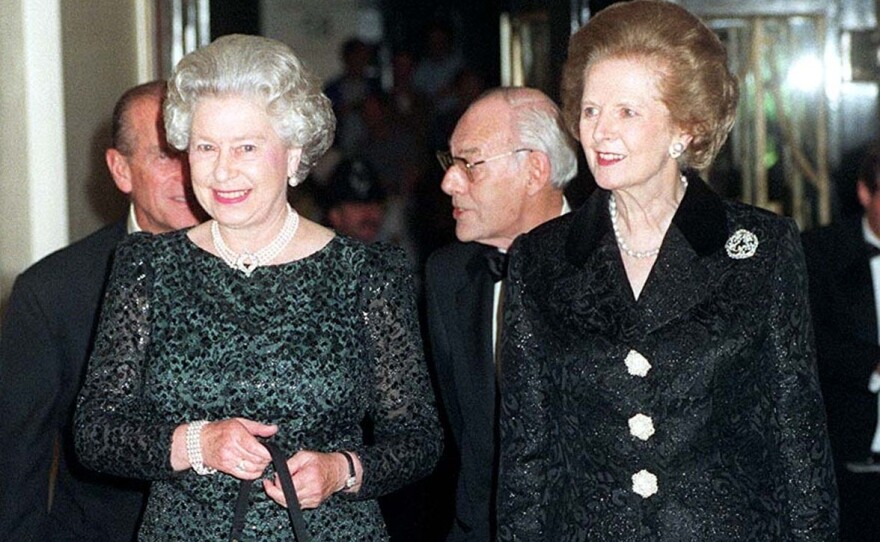
Margaret Thatcher, who as British prime minister in the 1980s became known as the "Iron Lady" for her tough economic policies, her partnership with President Reagan in standing up to communism and the short war with Argentina over the Falklands, has died.
Her spokesman, Lord Bell, tells the British Press Association that Baroness Thatcher died Monday following a stroke. She was 87.
As NPR's Jackie Northam reports:
"Thatcher's long journey to becoming one of Britain's most influential leaders began in humble surroundings. She was born on Oct. 13, 1925, in the small English town of Grantham. Her mother was a dressmaker, her father a grocer and a local politician.
"Thatcher often credited her father with introducing her to politics. She said he instilled in her the importance of being an independent thinker and of being able to stand on her own two feet -- values that she expected from all Britons once she gained power."
We'll have more on Thatcher and her legacy as the day continues. Hit your refresh button to see our latest additions.
Update at 9:55 a.m. ET. Opinions Remain Deeply Divided In Northern Ireland:
As The Guardian notes, the leader of Northern Ireland's Democratic Unionist party is calling Thatcher "one of the greatest political figures of post-war Britain." And Peter Robinson adds that "whilst we disagreed over the Anglo-Irish Agreement, Mrs Thatcher was committed to the union and later described the Anglo-Irish Agreement as one of her greatest regrets."
But Gerry Adams, president of Sinn Fein, said Monday that "working class communities were devastated in Britain because of her policies," the Guardian adds.
Update at 9:25 a.m. ET. Second President Bush Calls Her "An Inspirational Leader":
"She was an inspirational leader who stood on principle and guided her nation with confidence and clarity," former President George W. Bush says in a statement released by his office. "Prime Minister Thatcher is a great example of strength and character, and a great ally who strengthened the special relationship between the United Kingdom and the United States."
Update at 9:15 a.m. ET. Respect From The Opposition:
Ed Miliband, leader of Britain's Labor Party (which stands in opposition to Thatcher's Conservatives), says in a statement on his party's website that Labor politicians "disagreed with much of what she did and she will always remain a controversial figure. But we can disagree and also greatly respect her political achievements and her personal strength. ... She coped with her final, difficult years with dignity and courage. Critics and supporters will remember her in her prime."
Thatcher, Miliband adds, "moved the center ground of British politics and was a huge figure on the world stage."
Update at 9 a.m. ET. Remembering Her:
"Passionately opposed to communism, Thatcher's close friendship and political alliance with President Ronald Reagan played an important part in setting the stage for the end of the Cold War," NPR's Philip Reeves tells our Newscast Desk from his base in London. "In Britain, she changed the face of the nation's politics, though public opinion of her legacy is divided. A grocer's daughter, she rose to become the nation's first female prime minister. During that time she led her country into a controversial war with the Falklands, fought a ruthless battle against Britain's powerful unions, and privatized state run businesses and social housing."
Update at 8:50 a.m. ET. She "Transformed Her Time As Few Leaders Ever Have":
In 1991, President George H.W. Bush presented Thatcher with America's highest civilian award, the Medal of Freedom. Bush said of Thatcher, in part:
"It has been said that great leaders reflect their time. Margaret Thatcher did. She also transformed her time as few leaders ever have. Consider the 1980's and early '90s -- a golden age of liberty. Remember what she meant and how she mattered. Hers was not merely among Britain's finest hours. She helped mold perhaps democracy's finest era. ...
"Margaret Thatcher helped bring the cold war to an end, helped the human will outlast bayonets and barbed wire. She sailed freedom's ship wherever it was imperiled. Prophet and crusader, idealist and realist, this heroic woman made history move her way.
"Prime Minister, there will always be an England, but there can never be another Margaret Thatcher. Thank you for all you've done."
Update at 8:25 a.m. ET. Funeral Status "Same As Queen Mother And Princess Diana":
An indication of how Thatcher will be honored.
Update at 8:20 a.m. ET. Queen Is Saddened, Cameron Hails A "Great Leader":
According to the BBC, Queen Elizabeth II "is sad to hear the news of the death of Baroness Thatcher and will send a private message of sympathy to the family, Buckingham Palace says."
The current prime minister, David Cameron, says, "We've lost a great leader, a great Prime Minister and a great Briton."
Update at 8:15 a.m. ET. "Dominant Figure":
Thatcher was "the dominant figure of post-war British politics," writes Nick Robinson, the BBC's political editor. He adds, "Love her or loathe her, Margaret Thatcher shaped this country as few others did."
On our Newscast this hour, NPR's Philip Reeves said from London that Thatcher's "legacy is immense. She will of course internationally be remembered for partnership with Ronald Reagan, her close ally, in bringing about the circumstances that led to the end of the Cold War. Domestically, in Britain, she was a controversial figure. She is an iconic figure for British conservatives -- someone in the same stature as Winston Churchill. But for others in Britain she is still remembered for breaking the trade union movement. ... She will be remembered here for her enormous impact on the country."
Copyright 2013 NPR. To see more, visit www.npr.org.


